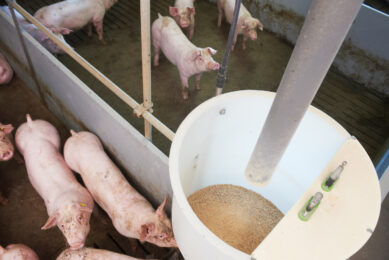Vaccine against boar taint reduces carbon footprint
Using Improvac, a vaccine to reduce boar taint is reducing the amount of greenhouse gases by 28 kg CO2 equivalents per pig.
The vaccine’s manufacturer Pfizer Animal Health reported this on the basis of research to environmental effects of vaccination against boar taint. The research was performed during nine months in several countries across the globe, in e.g. China, USA, Japan, Latin America, Australia and Belgium.
The research was performed by Gian Luca Baldo, for LC Engineering, Turin, Italy. In this study, it was found that vaccinated pigs produced 60 kg less manure in comparison to non-vaccinated control castrates – and their feed intake was 18 kg lower, compared to ‘a truck load of manure less per 500 pigs’. The reduction would mean a reduction of a pig producers’ carbon footprint by 3.6% per kg liveweight when it comes down to boars, he added.
Using these data, Baldo says that a general use of vaccination within the EU would have a similar result as reducing current traffic circulation with 1.6 million cars. “Due to castration, pigs lose their natural capacity to convert feed into muscle mass.”
In this research, the animal health company did not look at entire boars, not treated by the vaccine.
Fully entire boars
Herman Prüst, Pfizer, said that even in comparison with fully entire boars, vaccinated ones will prove to be more efficient. “Vaccinated boars can be sent to slaughter at a heavier weight and their behaviour will be less aggressive. This has a positive effect on feed conversion.”
In Europe, the vaccine is used in e.g. the Swiss pig industry and supermarket chain Colruyt in Belgium is also encouraging its use. The European Union allowed the use of the vaccine in 2009. In the United States, the vaccine is marketed as Improvest.
Related website:
• Pfizer Animal Health











